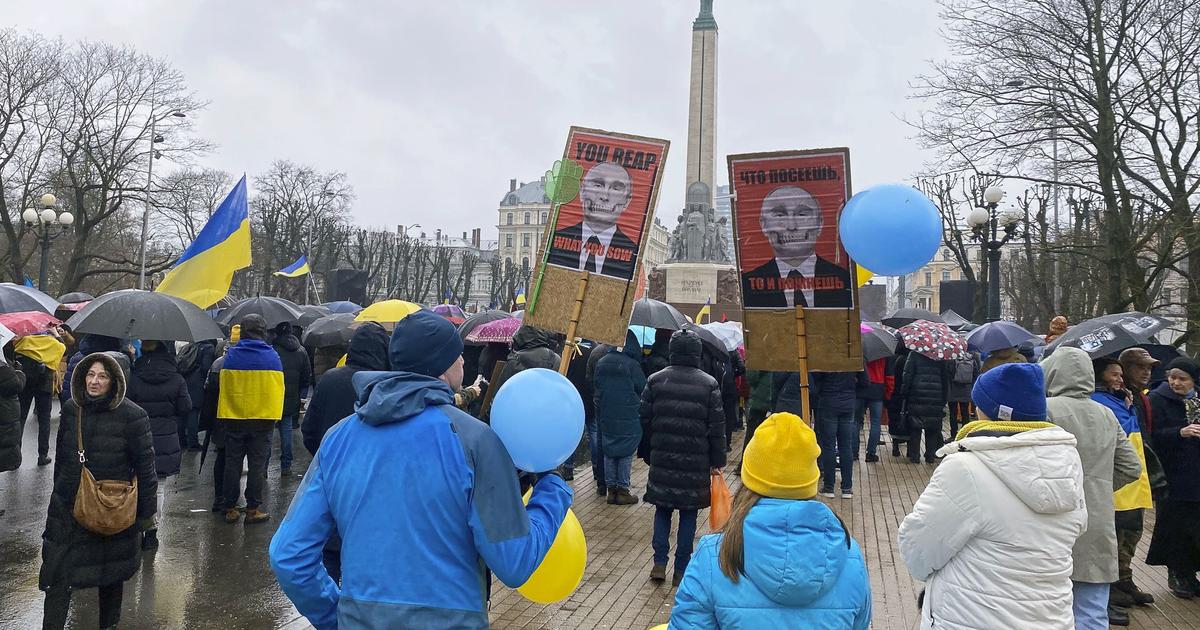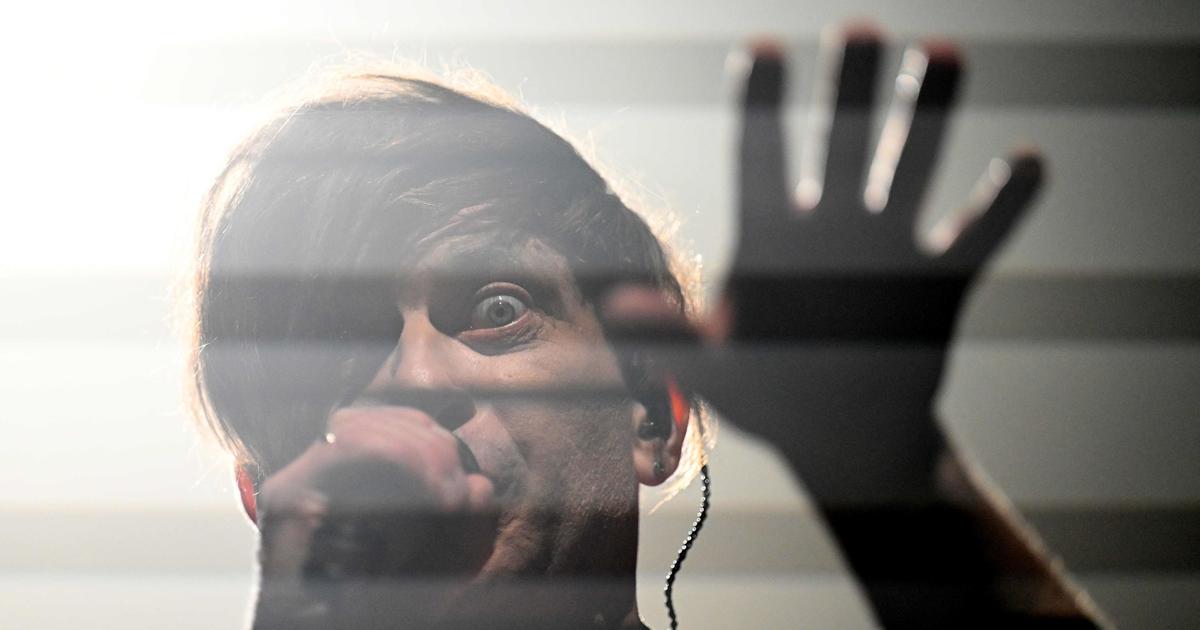A group of Russian journalists walk through a forest near Riga, on January 21.Carlos Torralba
A dozen Russian journalists meet every Saturday, at dawn, in a forest 20 kilometers from Riga.
With the first light of day, they embark on a walk through some slippery paths through the ice sheets.
As they walk in silence they stretch out their arms with a gymnastics stick.
Arriving at the beach, where a white blanket covers the sand, they charge their lungs with the sea breeze and meditate.
Back in the car park, they have some sweets and tea while they share anecdotes from their day-to-day life in the Latvian capital.
They all left Russia less than a year ago, shortly after the invasion of Ukraine began.
Like hundreds of other Russian journalists in exile in Riga, they live without a stable income or a clear outlook for the future.
With an added difficulty:
The activity on the shores of the Baltic Sea is organized by Riga Media Hub, a foundation that has helped more than 300 Russian professionals exiled in Riga to continue their information work and whose voices still reach part of the Russian citizenry, despite all the restrictions. .
One of them is Lev Kadik, a 45-year-old journalist and historian who worked, until his dismissal in the fall of 2021, as head of the Politics section at
Kommersant
, the business newspaper with the largest circulation in Russia.
“I was told that he was not following the [ruling United Russia] party line.
Always the party line, always, ”he recalls sardonically.
“The contents of
Kommersant
today they faithfully follow the official narrative, with a very slight seasoning of liberal criticism, although what reaches the reader is pure propaganda”, summarizes Kadik in one of the meeting rooms of the modern work space that Riga Media Hub makes available for free. disposition of Russian, Belarusian and Ukrainian journalists in a secret location – for security reasons.
More information
Latest news of the war in Ukraine
Kadik, an eloquent left-wing intellectual, began procedures to move to Riga in mid-February, 10 days before Russia attacked Ukraine.
“The war dispelled any doubts my wife or I might have had;
It is not easy to change your life when you have four children”, underlines the historian, the grandson of a Latvian.
Kadik, who now works for two different media outlets, is aware that Russian journalists in Latvia make some of the citizens uncomfortable, a sensation that was imperceptible in the spring, when dozens arrived every week fleeing the new laws that threatened them with 15 years in jail for posting any content that contradicted the official Kremlin line.
In Latvia, a country with less than two million inhabitants that borders Russia and Belarus, a large part of the population sees parallels between the current suffering of the Ukrainian population and that of their ancestors.
The invasion of the Red Army in 1940 and the massive deportations to Siberia after World War II are very present in the collective memory.
Since its independence in 1991, coexistence has been delicate between the Latvian majority and the Russian minority – around 25% of the inhabitants.
In March, while dozens of independent media outlets were relocating to Riga, the Latvian authorities blocked the signal of 80 Russian channels, some quite popular among the country's Russian-speaking community.
As in Estonia and Lithuania, the Latvian government ordered the demolition of all Soviet monuments in the summer.
In Daugavpils, the country's second largest city, the mayor defied the order until the last moment and dozens of people were arrested.
Kadik admits that among the ethnically Russian citizens he knows in Riga, there are several who were against the demolitions;
and others who have an equidistant vision of the war.
Ukrainian flags and a poster critical of Putin, in front of the Russian Embassy in Riga, in late January. Roman Koksarov (AP)
In September, Latvia banned Russian tourists from entering, and the authorities began scrutinizing visas for journalists seeking refuge in Riga, after secret services warned of possible infiltration by Kremlin spies.
Aleksandra Ageeva, director of the independent portal
Sota Vision
, lives with the uncertainty of not knowing what will happen when her visa expires in a few months, and regrets that journalists who take many risks on the ground no longer have a fast escape route to Latvia.
“In Russia you can only cover certain issues if you do it anonymously,” stresses Ageeva, who at 36 is trying to make a new life in the Latvian capital together with her mother and her son.
Ageeva began in 2015 recording solo demonstrations in Moscow and broadcasting them on YouTube.
Her project grew and today she has dozens of collaborators who cover any show of solidarity with the Russian political prisoners, especially with the opponent Alexéi Navalni, and with the Ukrainian population.
The journalist proudly shows a video recorded on New Year's Eve, 50 meters from the Kremlin, in which dozens of people dance while singing "Ukraine must not die."
Ageeva adds that in Russian television talk shows it was even said that "the people who appeared in that video deserved to die", and she shows her concern for two employees of
Sota Vision
, Ilia Makarov and Maksim Litvinchuk, who were arrested at the end of January in Moscow while covering a meeting of the municipal council.
At least 133 people have already been sentenced in Russia for publishing information contrary to official information or for "discrediting the Armed Forces", according to the independent organization OVD-Info.
Donations in the absence of subscribers
The Russian media based in Riga subsist on donations from individuals and organizations abroad, mainly German.
A year ago, their accounts were somewhat healthier due to subscriptions in Russia.
Since the Russian government declared them "foreign agents" - the majority in 2021 - the financing of these media is criminally punishable.
Social media and YouTube allow them to continue reaching their audience in Russia despite the Kremlin's attempts to silence them.
Some of the smaller ones, like the
Pskovskaya Guberniya
, receive just enough to survive.
Denis Kamaliagin and Pavel Dimitriev are two of the five employees — all in their thirties and exiled in Riga — at the only remaining independent media outlet in the Pskov region, which borders Estonia and Latvia.
Their website has been blocked by the Russian authorities up to 18 times, and each time they have had to cast a
mirror
(an exact replica with a very similar address).
They left Pskov after plainclothes officers confiscated all the electronic equipment in their office.
"They insisted that I not lose my passport, a clear invitation to leave the country," says Dimitriev.
Several of the
Pskovskaya Guberniya
collaborators still cover the information on the ground and send their chronicles to Riga.
In fleeing, Kamaliagin and Dimitriev were clear that their destination would be the capital of Latvia.
They ruled out other cities where dozens of Russian journalists have also moved, such as Tbilisi.
“Riga is a close city, in which almost everyone understands Russian, life is not very expensive and the government is more reliable than Georgia's”, sums up Dimitriev.
Not all Russian journalists residing in Riga have arrived in the last 12 months.
Some moved to the shores of the Baltic after the annexation of Crimea and the start of fighting in eastern Ukraine in 2014. The founders of
Meduza
, the independent outlet with the largest audience in Russia, are some of them.
In late January, the Kremlin took another step in its efforts to strangle
Meduza.
by declaring it an "undesirable organization";
It is no longer just a crime to finance it, but whoever makes statements for this medium or even whoever shares its content on social networks can also be imprisoned.
“We try to alert our readers of what they should not do in order not to incur any crime,” says Katerina Abramova, head of communication.
"Fortunately, the situation is not as terrible as in Belarus, where the mere fact of reading us is punishable," she denounces.
The most controversial episode has occurred with another of the main independent Russian media,
Dozhd
(Rain, in Russian).
The television network - the only one not controlled by the Kremlin that remained in Russia at the start of the war - has had a brief and difficult period in Riga.
The critical moment came after some comments by Alexei Korostelev, a popular 27-year-old commentator, in which he showed some empathy with the young Russians mobilized to the front without basic equipment.
His remarks were immediately harshly criticized by ministers from Latvia and Ukraine.
Korostelev was fired hours later, but the damage was irreparable:
Dozhd 's broadcast license
— which had already been sanctioned for using a map showing Crimea as Russian territory — was revoked a few days later.
Three employees resigned from their posts in solidarity with Korostelev.
The case of
Dozhd
, with an editorial line clearly opposed to the Russian regime and the war in Ukraine, reflects the difficult balance that exiled journalists in Riga are trying to find, who have to maintain closeness with their audience in Russia without raising blisters among the Latvians, who generally consider intolerable any hint of compassion for the population of the enemy country.
"We were aware that our situation in Riga was not easy, but we never imagined that they would veto us," says Tikhon Dziadko, editor-in-chief of
Dozhd.
.
Most of the workers of the news chain are preparing their second move in less than a year and in the next few days they will move to Amsterdam, where they will be able to continue broadcasting by cable with a license issued by the Netherlands.
"We do not intend to return to Latvia, but we are going to clean up our reputation in court," Dziadko settles.
The correspondents also settle in the Latvian capital
In Riga not only Russian journalists have settled.
Dozens of foreign media correspondents who worked in Moscow before the war have also chosen the Latvian capital as their new residence.
The American
Radio Free Europe/Radio Liberty
(RFE/RL) inaugurated its brand new headquarters in mid-January, in an act attended by the Latvian president, Egils Levits.
The director of the office, Elmars Svekis, comments that they currently have 40 workers, but that more will be hired in the coming months until "it comfortably exceeds a hundred".
RFE/RL also opened an office in Vilnius (Lithuania) at the beginning of January.
“There the service will be offered to the Belarusian public;
in ours, to Russian.
Since the start of the war, we have exponentially multiplied our audience through Facebook and YouTube", Svekis specifies, stressing that the situation for his collaborators and readers in Belarus - where two journalists from his organization are imprisoned - is "much more dangerous than in Russia”.
Germany's
Deutsche Welle
also opened its new offices in Riga at the end of December.
And other media, such as the
Financial Times
or the CBC (Canadian public broadcasting), have transferred part of their staff from Moscow to Riga.
Follow all the international information on
and
, or in
our weekly newsletter
.
Subscribe to continue reading
Read without limits
Keep reading
I'm already a subscriber

/cloudfront-eu-central-1.images.arcpublishing.com/prisa/NQRF6X34HVGKBGBCNPLKGPUW64.jpg)






/cloudfront-eu-central-1.images.arcpublishing.com/prisa/P7R2LVZ4KNEABCSKQ4KCDGKWMU.jpg)
